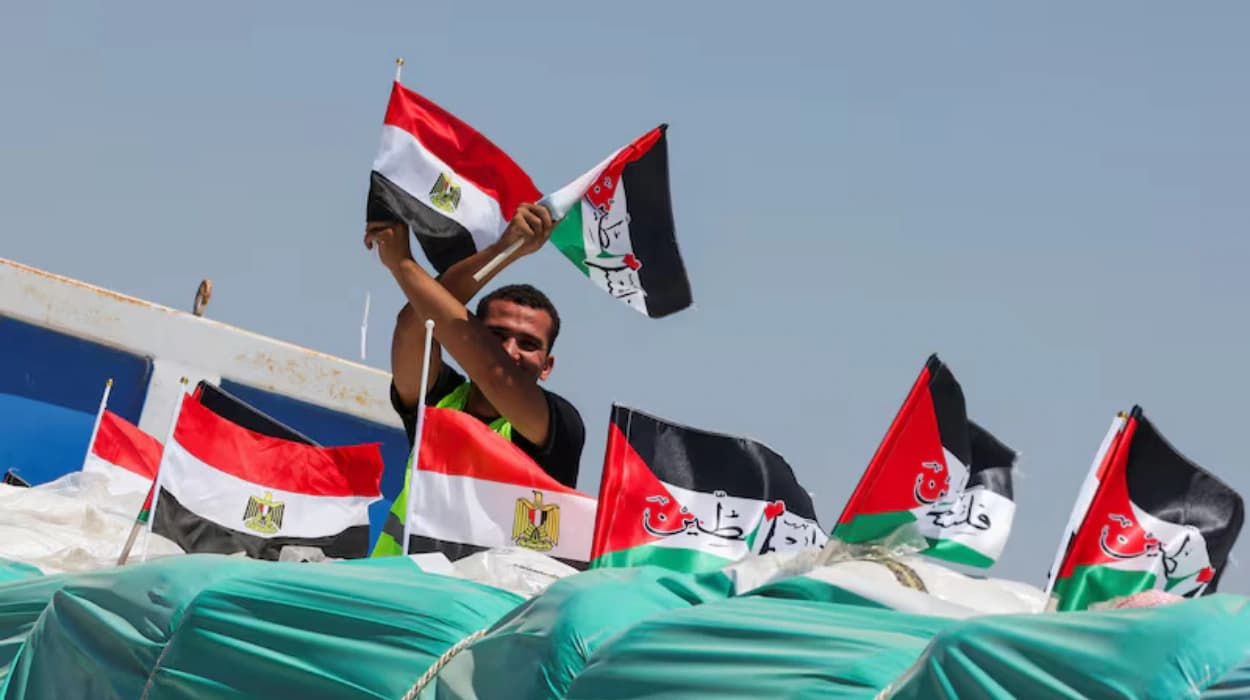Aid lorries have resumed crossing from Egypt into Gaza via
Rafah, amid escalating fears of famine in Gaza. Egyptian authorities are making
strenuous efforts to facilitate humanitarian aid, while intensifying diplomatic
efforts to avoid blame for worsening the humanitarian crisis.
What is happening at the Rafah crossing?
According to various media reports, humanitarian aid trucks
have restarted their movement into Gaza through the Rafah border crossing with
Egypt. After a period of closure due to security concerns and logistical
challenges, the Rafah crossing has become a critical lifeline for essential
supplies entering Gaza. As reported by journalists covering the region,
Egyptian authorities have opened the crossing to allow the passage of aid
convoys carrying food, water, and medical supplies to respond to the burgeoning
crisis in Gaza.
Why is Egypt keen to facilitate aid through Rafah?
Egypt’s government finds itself under intense international
scrutiny and diplomatic pressure to alleviate the humanitarian disaster
unfolding in Gaza. According to regional correspondents, Egypt is keen to avoid
charges of obstruction that could link it to increased risks of famine in
Gaza’s densely populated territories. The decision to resume aid lorry movement
is understood to be part of a calculated diplomatic and humanitarian effort to
demonstrate responsibility and responsiveness amid the ongoing conflict.
What is causing the famine concerns in Gaza?
Multiple news analyses point to the deteriorating conditions
in Gaza, where ongoing conflict and blockades have severely disrupted food and
medical supply lines. The blockade has created shortages of essential goods,
raising fears of widespread starvation and medical crises among the civilian
population. Humanitarian agencies have warned of the mounting risks of famine
and collapsing health services unless borders like Rafah remain open for aid
flows.
How significant is the Rafah crossing for Gaza's humanitarian situation?
The Rafah crossing is the principal gateway for Palestinians
in Gaza to access humanitarian aid from Egypt, especially when other borders
remain closed or restricted. Local journalists highlight that with Israel’s
crossings limited or closed, Rafah becomes the crucial conduit for delivering
vital assistance. The crossing’s status directly impacts the volume and
frequency of aid, affecting how quickly and effectively the international
community and local agencies can respond.
What challenges does Egypt face in managing the Rafah crossing?
Egyptian officials confront several logistical, political,
and security challenges in managing the Rafah crossing. Media sources note that
Egypt must balance security concerns regarding militant activities, pressure
from international actors demanding humanitarian relief, and its own political
interests in the volatile region. Reports indicate that Egypt is investing
considerable effort to ensure the crossing remains secure and operational
without escalating tensions or being accused of facilitating militant
infiltration.
Who are the main actors involved in the aid effort and border management?
Journalists reporting from the region identify multiple
stakeholders:
- Egyptian
border and customs authorities controlling the passage through Rafah.
- International
humanitarian organisations coordinating convoys and aid distribution.
- Palestinian
local authorities and health services receiving aid.
- Diplomatic
representatives urging Egypt and other stakeholders to maintain open and
secure channels.
According to field correspondents, these actors continue to
negotiate and coordinate under challenging circumstances to maximise aid
delivery while managing security risks.
What are the implications of the renewed aid flow for Gaza and the wider region?
The resumption of aid lorries brings cautious optimism but
underscores ongoing vulnerability. Media analysts emphasise that while aid is
critical to easing immediate suffering, the underlying political and security
issues that contribute to Gaza’s humanitarian crises remain unresolved. Egypt’s
role is pivotal yet fraught with complexity, as its efforts to avoid blame
could influence broader regional diplomacy and conflict dynamics.
How is the international community reacting to the situation?
International news agencies report varying responses:
- Some
states and humanitarian organisations have welcomed Egypt’s decision as a
necessary step to prevent famine and humanitarian collapse.
- Others
continue to press for wider border openings and sustained aid corridors
beyond Rafah.
- Diplomatic
voices warn of the fragile nature of such arrangements and call for
durable solutions rather than temporary relief.
What statements have Egyptian or Palestinian officials made?
While specific statements from Egyptian officials have
emphasised their commitment to humanitarian principles and border security,
Palestinian representatives have expressed relief at the crossing’s reopening
but stress the need for consistent and increased aid flows.
What remains to be seen?
Journalistic observers note that the situation remains
fluid. The ability of Egypt to maintain a reliable and secure passage at Rafah,
the capacity of aid organisations to scale up operations, and the evolution of
regional political conditions will all shape the unfolding humanitarian
scenario in Gaza.
